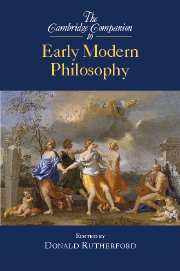Book contents
- Frontmatter
- Introduction
- 1 Innovation and orthodoxy in early modern philosophy
- 2 Knowledge, evidence, and method
- 3 From natural philosophy to natural science
- 4 Metaphysics
- 5 The science of mind
- 6 Language and logic
- 7 The passions and the good life
- 8 The foundations of morality: virtue, law, and obligation
- 9 Theories of the state
- 10 Theology and the God of the philosophers
- 11 Scholastic schools and early modern philosophy
- 12 Toward enlightenment: Kant and the sources of darkness
- Short biographies of major early modern philosophers
- Bibliography
- Index
- Series list
7 - The passions and the good life
Published online by Cambridge University Press: 28 January 2007
- Frontmatter
- Introduction
- 1 Innovation and orthodoxy in early modern philosophy
- 2 Knowledge, evidence, and method
- 3 From natural philosophy to natural science
- 4 Metaphysics
- 5 The science of mind
- 6 Language and logic
- 7 The passions and the good life
- 8 The foundations of morality: virtue, law, and obligation
- 9 Theories of the state
- 10 Theology and the God of the philosophers
- 11 Scholastic schools and early modern philosophy
- 12 Toward enlightenment: Kant and the sources of darkness
- Short biographies of major early modern philosophers
- Bibliography
- Index
- Series list
Summary
Introducing his Essay on the Nature and Conduct of the Passions and Affections, which was published in 1728, Francis Hutcheson remarked that the conclusions he was about to defend were none the worse for having been “taught and propagated by the best men of all ages.” Among the views that writers such as Hutcheson inherited were various images of the good life, some handed down from Roman antiquity, some derived from Christianity, and some, such as Machiavelli’s account of princely virtù, forged in comparatively recent times. While the most general of these interpretations offer a picture of the good life for humanity, a blueprint of the patterns of feeling and action to which all men (and in some cases arguably all women) should aspire, others are explicitly adjusted to persons of a particular gender, class, or profession, and to individuals who occupy several roles at once. Handbooks such as Cicero’s De officiis not only specify what is involved in being a good father, son, husband, or magistrate, but also indicate how the demands imposed by these relationships can be reconciled. Living virtuously is therefore partly a matter of experiencing passions that are held to be appropriate to one’s station and its duties, and ideally consists in possessing them to just the right degree. Furthermore, because any one role is defined in relation to others (that of a ruler in relation to that of a citizen, or that of a servant in relation to a master), the demands of a particular office are implicitly both social and political. With few exceptions, good lives are conceived as contributing to a cooperative existence within an organized community, and virtuous individuals are therefore expected to be emotionally capable of engaging in a range of common projects.
- Type
- Chapter
- Information
- The Cambridge Companion to Early Modern Philosophy , pp. 198 - 220Publisher: Cambridge University PressPrint publication year: 2006
- 3
- Cited by

